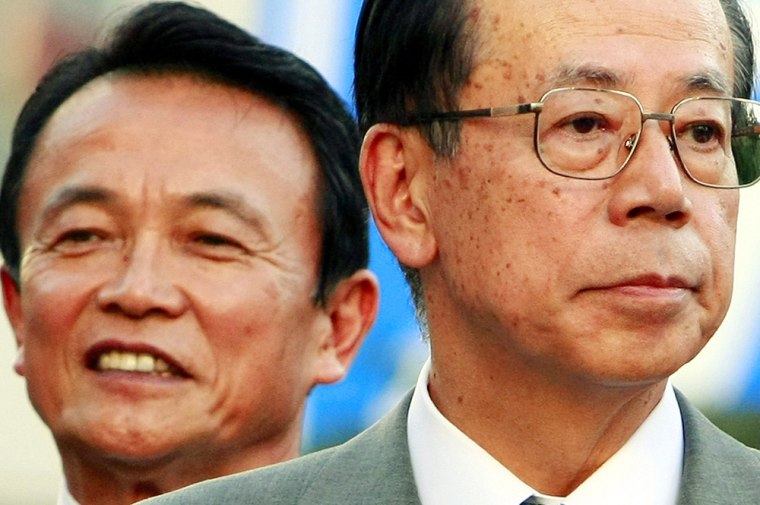Japan's ruling and top opposition parties have agreed to set the election in parliament for the new prime minister on Sept. 25, Kyodo News agency reported Tuesday.
Prime Minister Shinzo Abe abruptly announced on Sept. 12 he would resign.
The Kyodo report said the ruling Liberal Democratic Party and the opposition Democratic Party of Japan had agreed to dissolve Abe's Cabinet on Sept. 25 and hold a parliamentary vote to choose his successor the same day.
On Monday, two candidates vying to become Japan’s next prime minister began nationwide campaigns, avoiding thorny domestic issues but vowing to keep pressure on North Korea to resolve the past kidnapping of Japanese citizens.
The two are running to replace Abe, who said he was quitting for exhaustion and stress-related stomach problems. Abe is likely to be hospitalized for the rest of the week because he has shown no signs of recovery, the Kyodo News agency reported.
Yasuo Fukuda, a veteran moderate widely considered the front-runner, and the more hawkish former Foreign Minister Taro Aso are the only candidates in a ruling-party leadership race. The ruling party is going to select its candidate to replace him on Sunday, in preparation for the election on Sept. 25.
The new leader of the Liberal Democratic Party is ensured election as prime minister because of the party’s majority in the lower house of parliament.
Both candidates have said Japan cannot afford to drop out of the global war on terrorism and must extend its naval mission in support of U.S.-led coalition troops.
Since 2001, Japan’s navy has been providing fuel for coalition forces in Afghanistan under an anti-terrorism law that has been extended three times.
Abe had staked his job on pushing through the extension of the naval mission. But he resigned abruptly Sept. 12, leaving the future of the mission in limbo and triggering political confusion in the world’s second-biggest economy.
Candidates skirt domestic issues
Skirting issues such as money scandals that brought down Abe’s Cabinet and a pension payout problem, the two spoke together in the western city of Osaka and turned to relations with North Korea as their primary message.
“I want to resolve the issue of abduction, personally. I want everyone to trust me and give me your support,” Fukuda said. “I want to deepen our ties with our Asian neighbors, including China, and bring peace to this region,” he said.
Fukuda, 71, has reiterated he would stay away from the Yasukuni shrine, vilified by China and South Korea for its links to past Japanese militarism.
Once the longest-serving top government spokesman, he has said he will take a softer line than Abe on the abduction issue. Abe’s insistence on a resolution threatened to upset negotiations on the Communist country’s nuclear weapons.
Aso took a hard line. “People say dialogue, but there has never been any dialogue without pressure,” he said.
Slim chance for Aso?
North Korea returned five abductees in 2002, claiming the rest were dead. Abe demanded proof that no more Japanese were in North Korea, and he refused to give aid to the country under a regional disarmament deal earlier this year.
Aso is generally seen as a long shot and has conceded his chances are slim when the party votes.
During a talk show Sunday, Aso, 66, did not contest a moderator’s suggestion that Fukuda would most likely win the election, in which votes are cast by LDP lawmakers and regional representatives. But he said he decided to run “if only for the sake of holding an open election.”
